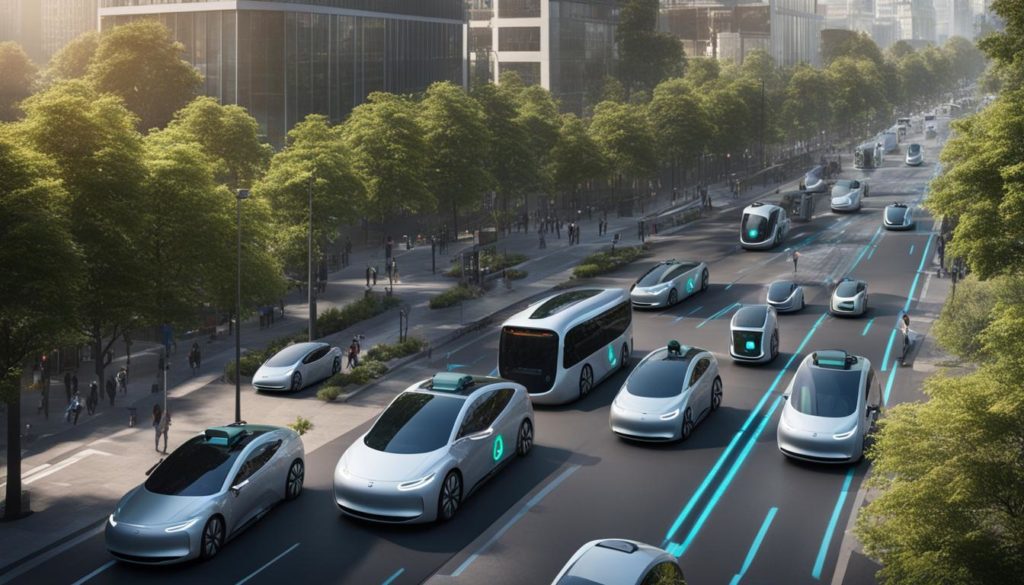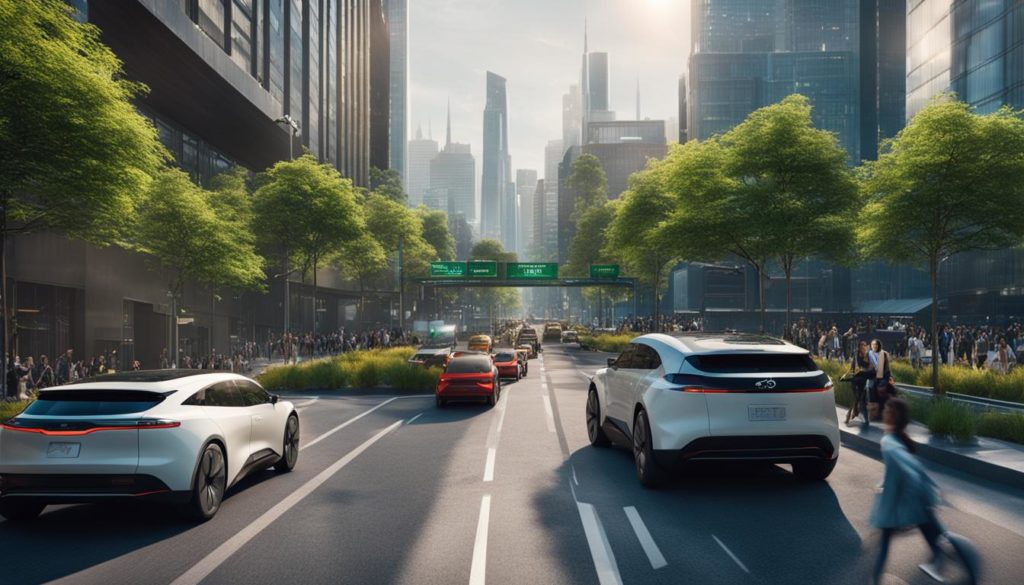AI transportation planning, sustainable transport, and eco-friendly mobility are key concepts in the transformation of the transportation industry. Artificial intelligence (AI) is revolutionizing the way we address traffic congestion, reduce carbon emissions, and promote sustainability in transportation networks.
AI utilizes advanced algorithms to analyze and forecast traffic patterns, optimizing the flow of vehicles on the roads. By leveraging data from traffic cameras, GPS devices, and social media, AI predictions help predict and prevent traffic congestion, leading to shorter travel times and improved efficiency.
Furthermore, AI plays a vital role in enhancing public transportation systems. It optimizes bus and train schedules, ensuring that services align with passenger demand while reducing fuel consumption and operating costs. By identifying maintenance requirements for infrastructure, AI also contributes to the longevity and safety of public transportation networks.
One of the critical advantages of AI in sustainable transportation planning is its impact on road safety. By analyzing historical data and implementing targeted safety measures, AI helps reduce accidents and enhances the overall safety of transportation systems. These advancements not only protect human lives but also lead to fewer traffic disruptions and delays.
Key Takeaways:
- AI technology revolutionizes transportation planning and enhances sustainability.
- AI analyzes data from various sources to predict and prevent traffic congestion.
- Optimizing public transportation schedules improves efficiency and reduces fuel consumption.
- AI plays a crucial role in improving road safety and reducing accidents.
- Implementing AI in transportation planning promotes eco-friendly mobility and sustainability.
AI in Autonomous Vehicles and Sustainable Transport
Artificial Intelligence (AI) is revolutionizing the transportation industry, particularly in the development of autonomous vehicles. By harnessing the power of AI, these vehicles are becoming safer, more efficient, and more sustainable.
AI plays a critical role in the decision-making processes of autonomous vehicles, enabling them to navigate roads with precision. Through data collected from sensors and cameras, AI processes real-time information about the vehicle’s surroundings. This includes detecting obstacles, recognizing traffic signals, and selecting the optimal route.
By utilizing AI, autonomous vehicles can operate more fuel-efficiently, resulting in reduced carbon emissions. AI optimizes energy consumption in electric vehicles by determining the most efficient use of battery power based on factors such as speed and terrain. This promotes sustainability by maximizing the range and efficiency of electric vehicles.
Furthermore, AI enhances the safety of autonomous vehicles and promotes sustainable transport. It has the capability to analyze historical data and identify patterns to improve road safety measures. Through AI-powered systems, autonomous vehicles can predict and respond to potential risks, reducing the likelihood of accidents and enhancing overall safety on the roads.
AI in Autonomous Vehicles: Key Advantages
- Enhanced safety through real-time obstacle detection and accident prevention
- Optimized energy consumption in electric vehicles for sustainability
- Efficient route selection for reduced travel time and fuel consumption
- Potential to revolutionize public transportation systems through autonomous buses and shuttles
AI in Autonomous Vehicles: Challenges and Future Outlook
While AI has immense potential in autonomous vehicles, there are challenges to overcome. These include ensuring robust cybersecurity measures, addressing ethical considerations, and navigating complex regulatory frameworks. However, with continued advancements in AI technology, the future of autonomous vehicles and sustainable transport looks promising.
AI in Logistics Industry for Sustainable Transport
The logistics industry plays a crucial role in ensuring the efficient movement of goods, but it also has a significant impact on the environment. However, with the integration of AI, the industry is transforming towards a more sustainable future. AI in the logistics industry utilizes advanced algorithms and data analysis to optimize operations, reduce fuel consumption, and minimize emissions.
One significant way AI contributes to sustainable transport in logistics is through route optimization. By analyzing vast amounts of data, including traffic patterns, weather conditions, and delivery schedules, AI can identify the most efficient routes for transporting goods. This not only reduces fuel consumption but also minimizes traffic congestion, resulting in a more environmentally friendly transport system.
Moreover, AI plays a vital role in enhancing safety in the logistics industry. It can monitor driver behavior, detect potential hazards on the road, and provide real-time alerts to prevent accidents. By promoting safer driving practices and reducing the risk of accidents, AI helps create a more sustainable and secure transportation environment.
| AI in Logistics Industry Benefits | Impact |
|---|---|
| Route Optimization | Reduces fuel consumption and minimizes traffic congestion |
| Safety Enhancement | Promotes safer driving practices and reduces the risk of accidents |
| Improved Customer Service | Real-time updates and enhanced overall experiences |
Furthermore, AI improves customer service in the logistics industry. It enables real-time updates on delivery status, estimated time of arrival, and potential delays. This level of transparency and efficiency ensures a better overall experience for customers and contributes to a more sustainable transport system.
In conclusion, the integration of AI in the logistics industry has significant implications for sustainable transport. It optimizes routes, enhances safety, and improves customer service, all while reducing fuel consumption and minimizing emissions. By embracing AI technologies, the logistics industry can contribute to a greener and more sustainable future for transportation.
AI and Carbon Emissions Reduction in the Transport Sector
The transport sector is a significant contributor to global carbon emissions, and reducing these emissions is crucial for achieving sustainable transportation. Artificial Intelligence (AI) has emerged as a powerful tool in addressing this challenge by improving the efficiency of existing transport systems and driving the development of new sustainable technologies.
AI can optimize routes, schedules, and the charging of electric vehicles based on data analysis, resulting in reduced fuel consumption and emissions. By analyzing large volumes of data, AI can identify the most efficient transportation options, considering factors such as traffic patterns, road conditions, and energy consumption. This data-driven approach enables decision-makers to implement targeted measures that minimize environmental impact and promote sustainable transport.
“AI has the potential to revolutionize the transport sector and unlock significant emissions reduction, making our transportation systems more sustainable and environmentally friendly.”
– Transport Expert
Table: AI Applications for Carbon Emissions Reduction in the Transport Sector
| AI Application | Description |
|---|---|
| Route Optimization | AI algorithms analyze traffic data to identify the most efficient routes, reducing travel time and fuel consumption. |
| Energy Management | AI optimizes the charging and energy consumption of electric vehicles, maximizing their efficiency and minimizing emissions. |
| Transport Planning | By analyzing data on traffic demand and patterns, AI helps plan public transportation systems that are optimized for efficiency and sustainability. |
| Infrastructure Maintenance | AI can predict maintenance requirements for transportation infrastructure, ensuring optimal performance and reducing energy waste. |
AI is also driving innovation in the development of new sustainable technologies in the transport sector. By leveraging AI’s data processing capabilities, researchers and engineers can accelerate the design and optimization of electric vehicles, lightweight materials, and energy-efficient transport systems. These advancements not only reduce carbon emissions but also contribute to the overall sustainability of the transport industry.
As AI continues to evolve and new applications emerge, its potential for carbon emissions reduction in the transport sector will only grow. By harnessing the power of AI, we can create more sustainable transportation systems that minimize environmental impact while promoting economic growth and improved quality of life.

AI in Smart Cities for Sustainable Transport
Smart cities are harnessing the power of AI to create sustainable and efficient transportation systems. By incorporating AI technologies, these cities are able to optimize traffic management, enhance public transportation, and reduce environmental impact.
AI plays a crucial role in managing traffic within smart cities. It analyzes traffic patterns and real-time data to predict demand and recommend efficient routes. This not only reduces congestion but also improves the overall flow of traffic, resulting in shorter travel times and reduced emissions.
Furthermore, AI is used to optimize public transportation networks in smart cities. It helps adjust schedules and routes based on passenger demand, ensuring that public transportation is efficient and accessible to all. By using AI, cities can better manage resources and provide a seamless and convenient travel experience for their residents.
| Benefits of AI in Smart Cities for Sustainable Transport |
|---|
| Optimized traffic management |
| Enhanced public transportation |
| Reduced environmental impact |
AI also contributes to sustainability in the logistics industry by optimizing freight transportation. It analyzes data to identify the most efficient routes for deliveries, reducing fuel consumption, emissions, and traffic congestion. Additionally, AI enables real-time monitoring of traffic and emissions, allowing for targeted interventions to further reduce environmental impact.
In conclusion, AI is revolutionizing transportation in smart cities, making it more sustainable, efficient, and environmentally friendly. By leveraging AI technologies, cities can optimize traffic management, enhance public transportation networks, and reduce the environmental impact of transportation systems.

AI in Planning and Managing Sustainable Transport Networks
AI is revolutionizing the way we plan and manage sustainable transport networks. By harnessing the power of artificial intelligence, we can optimize existing transportation systems, develop autonomous vehicles, improve safety, and enhance the overall transport experience. Let’s explore how AI is transforming the future of sustainable transportation.
One of the key applications of AI in transport planning is the optimization of routes and schedules. AI algorithms analyze vast amounts of data, including traffic patterns, historical information, and real-time data, to make informed decisions about the most efficient routes and schedules. This optimization not only reduces congestion and travel times but also minimizes fuel consumption and emissions, making transport more sustainable.
AI also plays a crucial role in the development of autonomous vehicles, which are expected to be more efficient and eco-friendly than traditional vehicles. AI powers the decision-making processes in autonomous vehicles, enabling them to navigate roads safely and choose the most fuel-efficient routes. By reducing reliance on fossil fuels and optimizing energy consumption, AI contributes to a more sustainable transport system.
Table: Benefits of AI in Planning and Managing Sustainable Transport Networks
| Benefits of AI | Description |
|---|---|
| Optimized routes and schedules | AI analyzes data to determine the most efficient routes and schedules, reducing congestion and travel times. |
| Development of autonomous vehicles | AI powers the decision-making processes in autonomous vehicles, making them more efficient and eco-friendly. |
| Improved safety | AI analyzes historical data to identify potential hazards and implement targeted safety measures. |
| Enhanced customer experience | AI improves the efficiency of public transportation and provides real-time updates for a better overall transport experience. |
Furthermore, AI contributes to improving safety and customer service in the transportation industry. By analyzing historical data and real-time information, AI can identify potential hazards and implement targeted safety measures. Additionally, AI enhances the customer experience by improving the efficiency of public transportation systems, providing real-time updates, and personalizing services based on individual preferences.
Overall, AI is a game-changer in planning and managing sustainable transport networks. It optimizes routes and schedules, powers the development of autonomous vehicles, improves safety, and enhances the overall transport experience. By embracing AI in transportation, cities and countries can create more efficient, safe, and environmentally friendly transportation systems.
Conclusion
The potential of AI in transforming sustainable transportation is staggering. By harnessing artificial intelligence algorithms, we can optimize traffic flow, enhance public transportation systems, and improve road safety. The economic benefits are significant, with increased productivity and job opportunities in data analysis and transportation planning.
AI plays a critical role in the development of autonomous vehicles, enabling safer and more fuel-efficient driving. It also optimizes logistics operations, reducing fuel consumption, emissions, and traffic congestion. The integration of AI into smart cities allows for the management of traffic patterns, predicting demand, and recommending efficient routes. By monitoring and reducing environmental impact, targeted interventions can be made to create more sustainable and eco-friendly transportation systems.
Embracing AI in planning and managing sustainable transport networks is essential for shaping a future that is both efficient and environmentally friendly. The transformative potential of AI in sustainable transportation cannot be ignored. With AI, we can create more efficient, safe, and sustainable transportation systems, contributing to a greener and more sustainable future.
FAQ
What is AI traffic prediction?
AI traffic prediction is the use of artificial intelligence algorithms to analyze and forecast traffic patterns using data from traffic cameras, GPS devices, and social media.
How does AI traffic prediction help reduce congestion?
AI traffic prediction optimizes traffic flow by analyzing data and making informed decisions about routes and schedules, reducing congestion and improving traffic flow.
How does AI contribute to road safety?
AI analyzes historical data and implements targeted safety measures, helping to improve road safety by reducing accidents and identifying areas that require safety improvements.
What role does AI play in autonomous vehicles?
AI powers the decision-making processes of autonomous vehicles, allowing them to navigate roads safely and efficiently by detecting obstacles, recognizing traffic signals, and choosing the best route.
How does AI optimize logistics operations?
AI analyzes vast amounts of data to create predictive models that identify the most efficient routes for deliveries, reducing fuel consumption, emissions, and traffic congestion.
How can AI contribute to reducing carbon emissions in the transport sector?
AI optimizes routes, schedules, and the charging of electric vehicles based on data analysis, contributing to the reduction of emissions in the transport sector.
How does AI help create sustainable transport in smart cities?
AI helps manage traffic, optimizes public transportation networks, and reduces environmental impact through real-time monitoring and interventions in smart cities.
What is the potential of AI in planning and managing sustainable transport networks?
AI optimizes transportation networks, enhances public transportation, improves safety, and contributes to creating efficient and environmentally friendly transport systems.
What is the transformative potential of AI in sustainable transportation?
AI has immense potential in optimizing traffic flow, enhancing public transportation, improving road safety, and reducing emissions, ultimately shaping a sustainable and efficient future for transportation.
- Customer Engagement and Loyalty: Innovating the Future of Saudi Arabia’s Dedicated Cargo Airline - December 23, 2024
- Regulatory and Compliance: Pioneering the Future of Saudi Arabia’s Dedicated Cargo Airline - December 21, 2024
- Financial Strategies: Fueling the Growth of Saudi Arabia’s Dedicated Cargo Airline - December 20, 2024






